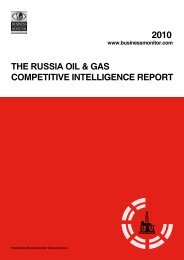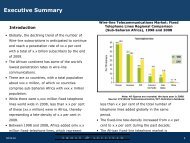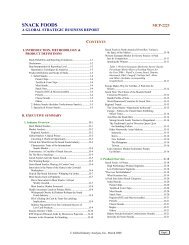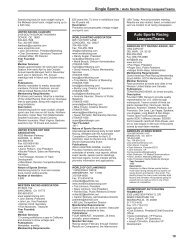You also want an ePaper? Increase the reach of your titles
YUMPU automatically turns print PDFs into web optimized ePapers that Google loves.
<strong>IMS</strong> COM PANY PRO FILES TAKEDA<br />
The epi der mal growth fac tor re cep tor is over-ex pressed in a va ri ety of can cers in clud ing lung, breast,<br />
pan cre atic, blad der, pros tate, colorectal, kid ney, head and neck cancers.<br />
Li cens ing: Amgen and Takeda an nounced in Feb ru ary 2008 that they have signed an agree ment un der<br />
which Takeda will de velop and com mer cial ize in Ja pan up to 13 of Amgen’s early- to mid-stage clin i cal<br />
can di dates. The al li ance in cludes Amgen’s Vectibix (panitumumab), motesanib (AMG 706) and other<br />
ther a pies for can cer, in flam ma tion and neu rol ogy/pain. With the ex cep tion of motesanib, all mol e cules<br />
in cluded in the part ner ship are biologics. Amgen is en ti tled to an upfront cash pay ment of $200m, up to<br />
$340m in world wide de vel op ment costs, $362m in suc cess-based mile stone pay ments and dou ble-digit<br />
roy al ties on sales in Ja pan. Takeda will be come Amgen’s world wide part ner for motesanib, and will pay<br />
Amgen $100m upfront, $175m in suc cess-based mile stones for the first two in di ca tions and dou ble-digit<br />
roy al ties on sales in Ja pan. Takeda will pay 60% of on go ing clin i cal de vel op ment ex penses out side Ja pan<br />
and share po ten tial prof its out side Ja pan on a 50/50 ba sis. Amgen re tains cer tain co-pro mo tion rights in<br />
Ja pan on all pro grams. In con nec tion with these agree ments, Takeda ac quired Amgen’s sub sid iary in Ja -<br />
pan, Amgen KK and all shares of Amgen KK were trans ferred to Takeda dur ing 2008 and consequently,<br />
Takeda has exclusive development and commercialization rights in Japan.<br />
Clin i cal Data: Anal y sis of re sults in re la tion to biomarker KRAS in 2007 showed that Vectibix was in ef -<br />
fec tive in the 40% of met a static colorectal can cer pa tients who har bor a mu tated KRAS onco gene where<br />
this is al ways ‘turned on’ ir re spec tive of whether EGFR has been ac ti vated or ther a peu ti cally in hib ited.<br />
KRAS is part of the RAS fam ily of pro teins, long im pli cated in can cer and just down stream of the EGFR re -<br />
cep tor. This there fore in volves iden ti fy ing subpopulations within a larger in di ca tion (e.g. breast or<br />
colorectal) who will or will not respond to specifically targeted therapy.<br />
Amgen is con duct ing a phase III PRIME trial in 1,200 pa tients that com pares first line treat ment FOLFOX<br />
che mo ther apy with and with out Vectibix ef fects while a sec ond rial in 1,200 pa tients ex plores FOLRIEI<br />
(irinotecan-based) che mo ther apy with and with out Vectabix as sec ond line ther apy. Both tri als look at<br />
pro gres sion free sur vival (PFS) and over all survival (OS).<br />
In 2008, the most com mon side ef fect re ported from in terim anal y sis of on go ing colorectal tri als in 601<br />
pa tients was re ported to be skin rash, which oc curred in over half of the group com pared with 11% on the<br />
che mo ther apy group.<br />
In 2005, Amgen and Abgenix re ported re sults from a piv otal phase III trial of panitumumab in pa tients<br />
with met a static colorectal can cer who had failed stan dard che mo ther apy, in clud ing oxaliplatin and<br />
irinotecan. The study, in volv ing 463 pa tients at sites in Eu rope, Aus tra lia and Can ada, achieved its pri -<br />
mary end point of im prov ing pro gres sion-free sur vival in this pa tient pop u la tion; pa tients who re ceived<br />
panitumumab ev ery two weeks showed a 46% de crease in tu mor pro gres sion rate ver sus those who re -<br />
ceived best sup port ive care alone. This re sult ex ceeded the pre-spec i fied mea sure of pro gres sion-free<br />
sur vival that the trial was de signed to dem on strate (a 33% de crease in tu mor pro gres sion rate in<br />
panitumumab-treated pa tients ver sus pa tients re ceiv ing best sup port ive care). The study also met its<br />
sec ond ary end point of ob jec tive re sponse rate, as as sessed by cen tral ra di ol ogy re view. Ini tial safety<br />
data showed that ad verse events ob served were con sis tent with pre vi ous tri als of panitumumab, with the<br />
most com mon side ef fects be ing acneiform rash, fa tigue, nau sea and mild di ar rhea. No human<br />
anti-human (HAHA) or anti-panitumumab antibody formation was observed.<br />
Up dated re sults from an on go ing phase II study of panitumumab was pre sented in May 2005 at the 41st<br />
ASCO meet ing. The re sults dem on strate that panitumumab has antitumor ac tiv ity when ad min is tered as<br />
a sin gle-agent treat ment to pa tients with met a static colorectal can cer (mCRC) who have failed stan dard<br />
che mo ther apy. An in de pend ent cen tral ra di ol ogy re view de ter mined that treat ment with panitumumab<br />
re sulted in a 9% over all re sponse rate and me dian time to pro gres sion of 11.4 weeks. In ves ti ga tors re -<br />
ported that pa tients with mCRC tu mors ex press ing the EGFr pro tein who re ceived panitumumab<br />
monotherapy dem on strated a me dian sur vival time of 37.6 weeks and a me dian du ra tion of tu mor re -<br />
© 2009 <strong>IMS</strong> Health In cor po rated or its af fil i ates Page 64









